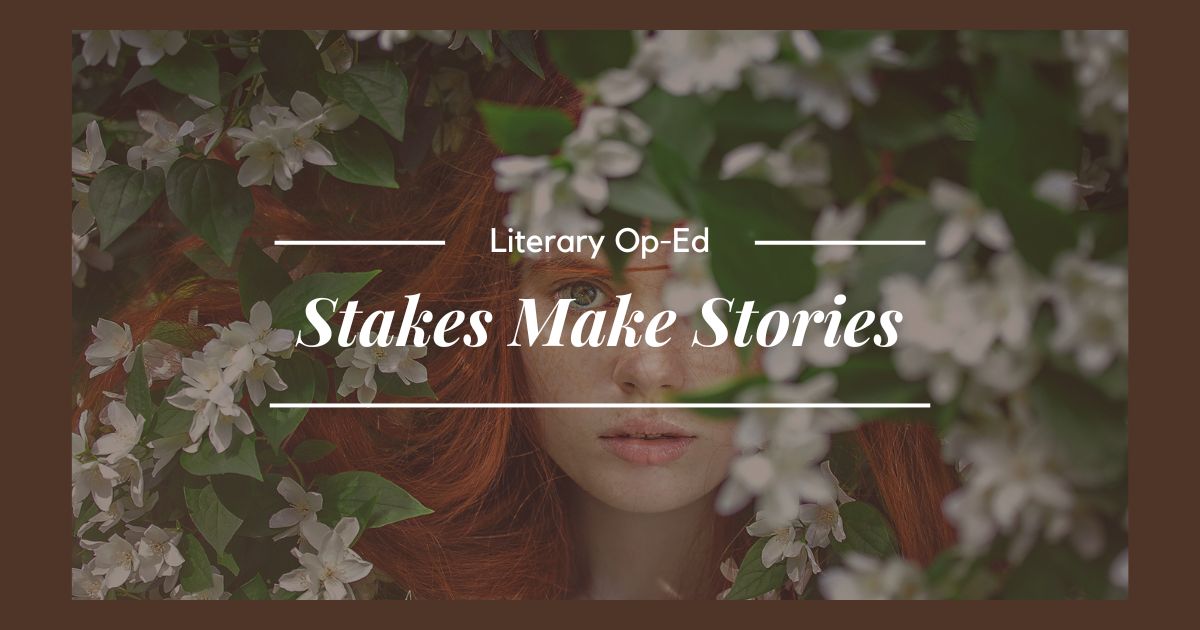We’re all familiar with quest and adventure stories. I don’t like them. Okay, okay – I understand I’m an outlier here. Some of the most popular books of all time are quest stories, like Lord of the Rings and The Lightning Thief, to name a couple. I tried them, and they weren’t for me.
But why?
Aside from just personal preference, the question of why I don’t like these wildly popular books has nagged at me. Especially as a fantasy reader. I recently attempted the graphic novel version of The Hobbit, hoping that if I had the art element it would be easier to get into. Long story short, I was zoning out about ten pages in, before anything of consequence had even happened.
So what’s the big deal? I think my issue, at least with the graphic novel of The Hobbit, is the lack of immediate personal stakes for the main character. Which led me to consider the role of stakes in stories more generally.
What are stakes?
Stakes are what the main character has to gain or lose by embarking (or not embarking) on the story. There’s usually bigger picture stakes like survival, saving the world from harm or authoritarian rule, finding love, or solving a murder – things like that. But what I really want to dive into are the personal stakes.
Personal or emotional stakes are specific to our main character and are often related the unique flaws, traumas, physical limitations, or fears that have kept them from acting on their goals.
If you know story structure, then you’re familiar with the term “inciting incident.” This is the moment, the catalyst, that sparks the true plot of the story. It’s when Hagrid whisks away Harry from his horrid life with the Dursleys. It’s the moment Katniss volunteers for the Hunger Games. The inciting incident is the moment everything changes for the main character.
When solid personal stakes have been established, the inciting incident often means that the main character has more to lose by not acting, even if there is significant fear and uncertainty about what comes next. If Harry refused to go with this large stranger, it would mean continuing to live with his abusive family. If Katniss refused to volunteer, it would’ve meant the death of her sister. And with both of these stories, the main character’s personal and emotional stakes were set immediately. From page one, we understood these characters’ specific lots in life.
Character stakes make us care.
Here’s the thing. If there are no immediate character stakes, then it’s not their story; it’s just a story. If the story feels like it could be happening to anyone, if the main character is just a vessel for the plot to happen to, then it’s not their story. And if it’s not their story, why should I care about them?
Now, I do want to say that sometimes this can be an intentional choice. Depending on the story, it might actually benefit from the character being more or less an average, content person with nothing specific to gain or lose when the story starts. As with everything I write about in these blogs, it’s subjective.
But more often than not, I want to root for the main character. If there’s no emotional strife, fears, misguided beliefs, strained relationships, or hardship – if there’s nothing to lose or gain or overcome – then what exactly do I have to root for?
For me, adventure and whimsy alone are not enough to create a well-rounded, layered, and interesting story.
Without personal character stakes, is the story interesting at all?
In my opinion, no. Not really. We read for the story, yes; for entertainment. But what separates a simply entertaining story from a story that we genuinely care about? Personal character stakes allow us to see ourselves and our world in a new light; it’s what hooks us. This is the feeling that keeps us coming back for more.
It’s why we feel a more visceral hate for Professor Umbridge than for the Dark Lord Voldemort. Voldemort is scary only the in the large way. He represents the overarching threat. If Harry loses, that means the wizarding world falls to evil. But Umbridge? She rules the school. It’s her that keeps Harry from gathering with friends and allies. She’s the one responsible for the dissolution of quidditch, of corporal punishment for petty offenses, of the general disruption of Harry’s life. Umbridge affects Harry personally, and so we’re more invested in her downfall.
In the show Avatar: The Last Airbender, we see a similar dynamic. We know right from the beginning that Avatar Aang, by chance, is the last surviving member of his community. Fire Lord Ozai is the big bad villain. He wages war, genocide, and oppression to gain and keep power. The final battle, the climax of the show, is Aang’s fight with Ozai – and it’s truly epic. But what sustained us for three seasons until then? Smaller fights with Prince Zuko (the one personally getting in Aang’s way), as well as Aang’s journey learning to wield his powers and overcome the loss of his entire people. He had personal stakes that made us care.
So, back to my issue with quests.
I feel this is why I struggle with quest stories in general. It’s too easy for it to feel like the story is just happening. A character is called away to find something, spends a lot of time travelling (which is the truly boring part for me), then they arrive, find or fight for the thing, win, and go home a changed person. Often, the only stakes established are the overarching, bigger ones, and few, if any, character-focused stakes. It can work for movies because they’re sustained by special effects, but it’s harder to pull off in books.
Perhaps one day I’ll look at quest and adventure stories with new eyes. But for now, they fall into the same heap of “no thanks” as pirates and ye olde English fantasy for me.
If you have a recommendation that you think I should try, one that could change my mind about these stories, please tell me. I’m always down for a book that could challenge my views.
Check out some of my other recent blogs:









2 responses to “Character Stakes: The real reason we read any story”
This reminds us that the best stories are not just about the events that transpire, but about the transformation of characters as they navigate the challenges and choices that lie ahead. 😉
Absolutely!